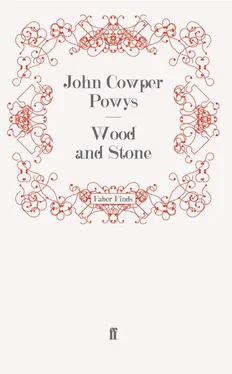Dangelis made no reply to this and they paced in silence under the tall exotic cedars until they reached the house.
“There’s mother!” cried the girl, pushing open the door that led into the kitchen premises, and pulling the American unceremoniously in after her. They found Mrs. Homer before a large oak table, set in the mullioned window of the house-keeper’s little room. She was arranging flowers for the evening’s dinner-table. The plump lady welcomed Dangelis effusively and made him sit down upon a Queen Anne settle of polished mahogany which stood in the corner of the fire-place. Gladys remained standing, a tall softly-moulded figure, appealingly girlish in her light muslin frock. She swayed slightly, backwards and forwards, pouting capriciously at her mother’s naive discourse, and loosening her belt with both her hands.
“Why should you ever go back to America?” Mrs. Romer was saying. “Don’t go, dear Mr. Dangelis. Stay with us here till the end of the summer. The Red room in the south passage was getting quite damp before you came. Please, don’t go! Gladys and I are getting so fond of you, so used to your ways and all that. Aren’t we Gladys? Why should you go? There are plenty of lovely bits of scenery about here. And you can have a studio built! Yes! Why not? Couldn’t he, Gladys? The lumber-room in the south passage — opposite where Lily sleeps — would make a splendid place for painting in hot weather. I suppose a north light, though, would be impossible. But some kind of glass arrangement might be made. I must talk to Mortimer about it. I suppose you rich Americans think nothing of calling in builders and putting up studios. I suppose you do it everywhere. America must be full of north light. But perhaps something of the kind could be done. I really don’t understand architecture, but Mortimer does. Mortimer understands everything. I daresay it wouldn’t be very expensive. It would only mean buying the glass.”
The admirable woman, whose large fair face and double chin had grown quite creased and shiny with excitement, turned at last to her daughter who had been coquettishly and dreamily staring at the smiling artist.
“Why don’t you say something, Gladys? You don’t want Mr. Dangelis to go, any more than I do, do you?”
The girl moved to the table and picking up a large peony stuck it wantonly and capriciously into her dress. “I have my confirmation lesson tonight,” she said. “I must be at Mr. Clavering’s by six. What’s the time now?” She looked at the clock on the mantel-piece. “Why, its nearly half-past four! I wonder where Lacrima is. Never mind! We must have tea without her. I’m sure Mr. Dangelis is dying for tea. Let’s have it out on the terrace.”
“At six?” repeated Mrs. Romer. “I thought the class was always at seven. It was given out to be seven. I heard the notice on Sunday.”
Gladys looked smilingly at the American as she answered her mother. “Don’t be silly, dear. You know Mr. Clavering takes me separately from the others. The others are all village people.”
Mrs. Romer rose from her seat with something between a sigh and a chuckle. “I hadn’t the least idea,” she said, “that he took you separately. You’ve been going to these classes for three weeks and you’ve never mentioned such a thing until this moment. Well — never mind! I expect Mr. Dangelis will not object to strolling down the drive with you. You’d better both get ready for tea now. I’ll go and tell somebody we want it.”
She had no sooner departed than Gladys began flicking the American, in playful childish sport, with a spray of early roses. He entered willingly into the game, and a pleasant tussle ensued between them as he sought to snatch the flowers out of her hands. She resisted but he pushed her backwards, and held her imprisoned against the edge of the table, teasing her as if she were a romping child of twelve.
“So you are going to these classes alone, are you?” he said. “I see that your English clergymen are allowed extraordinary privileges. I expect you cause him a good deal of agitation, poor dear man, if you flirt with him as shamelessly as you do with me. Well, go ahead! I’m not responsible for you. In fact I’m all for spurring you on. It’ll amuse me to see what happens. But no doubt all sorts of things have happened already! I suppose you’ve made Mr. Clavering desperately in love with you. I expect you persecute him unmercifully. I know you. I know your ways. “He playfully pinched her arm. “But go on. It’ll be an amusement to me to watch the result of all this. I like being a sort of sympathetic onlooker, in these things. I like the idea of hiding behind the scenes, and watching the tricks of a naughty little flirt like you, set upon troubling the mind of a poor harmless minister.”
The reply made by the daughter of the House to this challenge was a simple but effective one. Like a mischievous infant caught in some unpardonable act, she flagrantly and shamelessly put out her tongue at him. Long afterwards, with curious feelings, Dangelis recalled this gesture. He associated it to the end of his life with the indefinable smell of cut flowers, with their stalks in water, and the pungency of peony-petals.
Tea, when it reached our friends upon the stately east terrace, proved a gay and festive meal. The absence of the reserved and nervous Italian, and also of the master of Nevilton, rendered all three persons more completely and freely at their ease, than they had ever been since the American’s first appearance. The grass was being cut at that corner of the park, and the fresh delicious smell, full of the very sap of the earth, poured in upon them across the sunny flower beds. The chattering of young starlings, the cawing of young rooks, blended pleasantly with the swish of the scythes and the laughter of the hay-makers; and from the distant village floated softly to their ears all those vague and characteristic sounds which accompany the close of a hot day, and the release from labour of men and beasts. As they devoured their bread and butter with that naive greediness which is part of the natural atmosphere of this privileged hour in an English home, the three friends indicated by their playful temper and gay discourse that they each had secret reasons for self-congratulation.
Dangelis felt an exquisite sense of new possibilities in his art, drawn from the seduction of these surroundings and the frank animalism of his cheerful companions. He sat between them, watching their looks and ways, very much as Rubens or Franz Hals might have watched the rounded bosoms and spacious gestures of two admirable burgess-women in some country house of Holland.
Mrs. Romer, below her garrulous chatter, nourished fantastic and rose-colored dreams, in which inestimable piles of dollars, and limitless rows of golden haired grand-children, played the predominant part. Gladys, flushed and excited, gave herself up to the imagined exercise of every sort of wanton and wilful power, with the desire for which the flowing sap of the year’s exuberance filled her responsive veins.
Tea over, Dangelis suggested that he should accompany the girl to Mr. Clavering’s door.
“You needn’t be there for three quarters of an hour,” he said, “let’s go across to the mill copse first, and see if there are any blue-bells left.”
Gladys willingly consented, and Susan Romer, remaining pensive in her low cane chair, watched their youthful figures retreating across the sunlit park with a sigh of profound thankfulness addressed vaguely and obscurely to Omnipotence. This was indeed the sort of son-in-law she craved. How much more desirable than that reserved and haughty young Ilminster! Gladys would be, three times over, a fool if she let him escape.
A few minutes later the artist and his girl-friend reached the mill spinney. He helped her over the stream and the black-thorn hedge without too much damage to her frock and he was rewarded for his efforts by the thrill of vibrating pleasure with which she plunged her hands among the oozy stalks of those ineffable blue flowers.
Читать дальше












